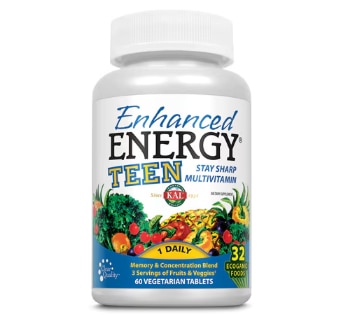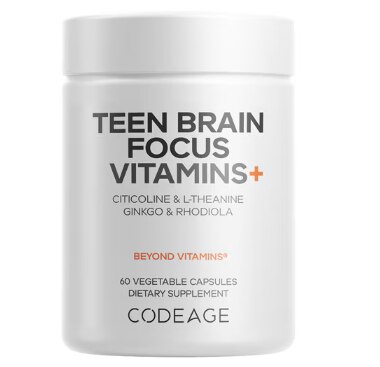Even though the brain mostly stops growing in size by adolescence, this stage is anything but settled. It’s a time of major change, as the brain trims away connections it doesn’t need, builds new ones and lays the groundwork for adult thinking.
Understanding what’s happening behind the scenes can make all the difference. With small, smart steps, like better sleep habits, balanced nutrition and science-backed supplements, it’s possible to support focus, emotional steadiness and healthy brain development during this pivotal phase.
Understanding the Teenage Brain
Brain development basics
Adolescence is a period of major brain renovation. The structure may be mostly in place by the early teen years, but the wiring is still a work in progress. The prefrontal cortex, the hub for planning, impulse control and decision-making, keeps developing into the mid-20s. At the same time, the brain is strengthening the connections it needs and clearing out the ones it doesn’t in a process called synaptic pruning.
Meanwhile, the amygdala (the brain’s emotional first responder) tends to activate faster than the logic-driven prefrontal cortex can keep up. That timing gap can make emotional reactions feel bigger and harder to manage.
During this time, teens are tuned into the world around them with high sensitivity. Their brains light up in response to social cues and peer feedback, which can make everything from praise to criticism feel extra intense. Combine that with a growing sensitivity to rewards and a not-quite-finished self-control center, and it’s easy to see why emotion sometimes takes the driver’s seat.
The good news is that the teen brain is especially adaptable. It’s primed to learn fast and respond to new challenges, which means this is also a powerful time to build lifelong habits.
Modern challenges to teen brain health
Teen brains are working overtime, and modern society doesn’t make it easy on them. Nearly every teen today uses social media daily, and many spend hours wrapped up in scrolling, posting and chatting. While social media can help kids connect with their friends, heavy use has been tied to sleep disruptions, shorter attention spans and more frequent stress spikes.
Sleep plays a big role, too. The American Academy of Pediatrics notes that good rest is essential for learning and memory, but natural circadian shifts make it hard for teens to fall asleep early, leading to sleep-deprived brains that struggle with focus, regulation and stress. Most fall short, which can cause the fogginess and irritability that parents might chalk up to typical teen ‘moodiness.’
Then there’s the academic load and pressure to perform, which can push stress hormones like cortisol into overdrive. And when those levels stay high for too long, they can interfere with memory and focus.
Nutrition is another piece of the puzzle. Skipped breakfasts and grab-and-go processed foods, and reliance on energy drinks is common, which means teens often miss out on essential nutrients that help with stable energy, focus and overall brain function.
The stressors of constant digital input, poor sleep, academic pressure and patchy nutrition can make it harder for teens to focus, manage emotions and recharge. That’s why solid lifestyle habits are so crucial during this stage.
Habits That Strengthen Teen Brain Health
What teens do every day shapes how their brains grow, adapt and manage stress. Here are some of the most impactful habits for teen brains.
Balanced nutrition
Teen brains burn through a lot of energy, and they need the right fuel to stay sharp, but many teens miss out on essentials like iron, zinc and B vitamins, which are key players in mood, focus and energy production. Omega-3s (especially DHA) are another big one, helping form the structure of brain cells and supporting memory and learning.
Choline, which is found in eggs and some fish, fuels acetylcholine, a neurotransmitter that supports focus and memory recall. Colorful fruits and veggies provide antioxidants that help guard those developing brain cells from damage. And magnesium, found in foods like leafy greens, nuts, and seeds, supports relaxation and healthy sleep cycles, which is a key part of teen recovery and brain reset.
Prioritizing sleep
Sleep is a must-have for memory, mood and emotional balance. Helping teens stick to regular bedtimes and easing off screens in the evening can go a long way toward better rest. Research shows that chronic sleep restriction in teens is linked to lower academic performance, mood swings, and riskier behavior. The American Academy of Sleep Medicine recommends 8 to 10 hours per night, yet most teens fall short, leaving developing brains without the recovery time they need.
Movement and exercise
Physical activity gets the blood flowing and primes the brain for learning. Aerobic exercise has been shown to boost attention, executive function and even school performance. Encouraging your teens to get involved with sports, walking the dog or dancing around the living room can give their brains a real advantage.
Mindful downtime
Unstructured, low-stimulation time, like reading, sketching or just hanging out in nature, helps reset the brain’s attention systems and ease stress. Little habits like these add up, creating the kind of environment where the teen brain can thrive.
Consider a supplement
For some families, adding a daily supplement can be a helpful way to fill nutritional gaps, especially when busy schedules or picky eating get in the way of a balanced diet. Formulas made specifically for teens, like Codeage Teen Brain Focus, blend nutrients such as citicoline, L-theanine and plant-based compounds into one convenient option.
Citicoline has been linked with improved attention and mental performance, while L-theanine, an amino acid found in green tea, is known for promoting calm focus without drowsiness. Adding supplements can support (not replace) the foundation of healthy food, regular sleep, and daily movement.
Helping the Teen Brain Thrive
The teenage brain is a work in progress, constantly rewiring, adapting and laying down the tools needed for adulthood. While this stage comes with its share of challenges like social stress, academic pressure and shifting sleep patterns, parents have real, effective ways to help.
Balanced meals, good sleep, regular movement and moments of mindful downtime all work together to boost focus and emotional steadiness. Some families might benefit from a well-chosen supplement that offers added support to add to the basics.
Giving your teen steady encouragement and thoughtful routines can help them move through this phase with more clarity, confidence and a foundation for lifelong brain health.




